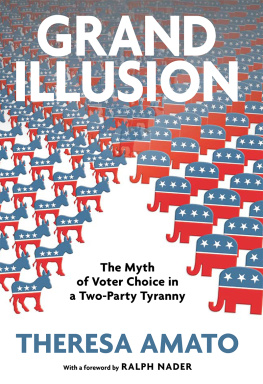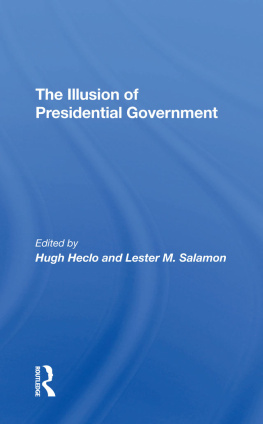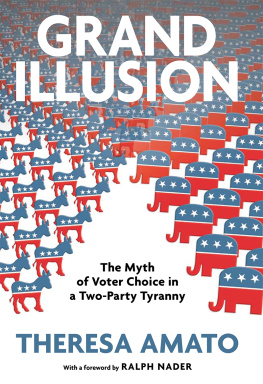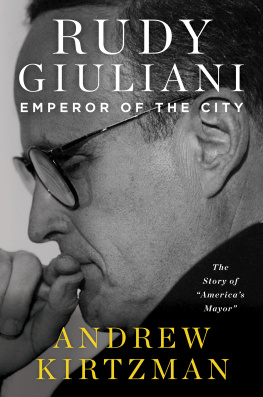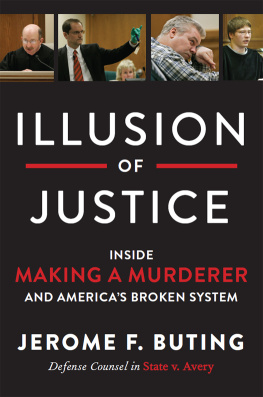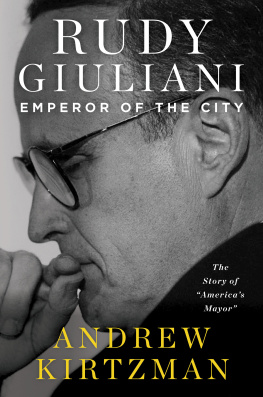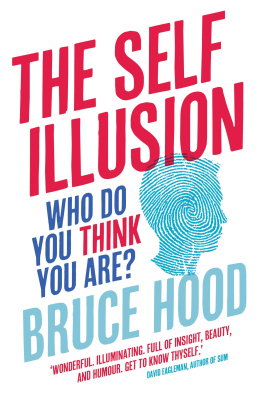For Jack Newfield, who loved his city and his craft.
For the men and women who sacrificed so much in the rescue and recovery effort at Ground Zero.
F IVES, A RESTAURANT in Manhattans Peninsula Hotel, was one of Rudy Giulianis regular places, and when New York Citys mayor arrived there for breakfast on September 11, 2001, his favorite table was waiting for him. It was large, round, and located in a nook beneath a bay window. As always, the tables in front of and behind him were left open. The seat Giuliani selected gave him a view of Fifth Avenue, the entryway, and a good portion of the restaurant itself. Although he didnt like to be disturbed while dining, Giuliani always seemed to have an eye on what was going on around him.
His breakfast companions were Denny Young, a top aide, and a friend, Bill Simon, who was hoping to run for governor of California with Giulianis endorsement. Entering the restaurant, Giuliani worked the room, smiling and shaking hands before taking a seat at his table. The mayors security detail split up as he sat down. All modern New York mayors have traveled with a retinue, and Giulianis concern for physical protection was long-standing, the product of an earlier career spent prosecuting Mafia cases. One bodyguard took up position at the hostess station at the head of the stairway leading into Fives. The other stood in front of the wall behind the mayors table.
Zack Zahran, the restaurant manager, watched his celebrity guest as the three men ordered coffee and began discussing Simons gubernatorial campaign. At around 8:50 A.M. , he saw one of Giulianis bodyguards leave her post near the mayors table and come forward to whisper in the mayors ear. Zahran saw no change in Giulianis expression or sense of emergency in his demeanor. As he recalled it, the mayor chatted with Young and Simon for another minute or so before exiting the same way he arrivedmoving through the restaurant for another round of smiles and handshakes.
Denny Young followed his boss. Left behind was Bill Simon. According to a Simon aide, Giuliani told his friend, A plane hit the World Trade Center. Ive got to go, and Simon replied, All right. In Giulianis subsequent account of his departure, Simon came out looking more prescient. Without knowing the enormity of what had happened, the mayor recalled, Bill said to me, God bless you.1
Also left behind on the table were three unopened menus. As the day unfolded and images of the crashing towers and a soot-and ash-covered Giuliani flashed on TV screens, manager Zahran had the same thought over and over again: Oh my God, the man didnt have breakfast!2
It was the beginning of the most important day in many American lives, Rudy Giulianis included. Later, when the chorus of praise for Giulianis performance would swell so loud the mayor of New York City began to sound like a combination of Winston Churchill and Spiderman, his political peers began to grumble that he had only done what any responsible elected official would have done in his shoes. Mark Green, the leading Democratic candidate to replace Giuliani in the 2001 election, said as much at the time. I actually believe that if, God forbid, I had been the mayor during such a calamity, I would have done as well or better than Rudy Giuliani, he said, and was hit with a wave of outrage from New Yorkers who wanted to believe that Giuliani was every bit the unique hero he had seemed that day.
We will never know how Green would have behaved as mayor under any circumstanceshe lost the election to Michael Bloomberg that November. But on September 11, no other public figure rose to the occasion the way Giuliani did. It took George W. Bush more than a day to completely digest what was going on and to craft an appropriate response. The president was, of course, operating in a different environment. Bush had trouble getting a full picture of what was happeningthe high-tech Air Force One kept losing telephone and television reception.
Giuliani, on the other hand, began to understand that things were very, very bad a few minutes after he left the restaurant. He, Young, and two police bodyguards sped downtown in a Chevrolet Suburban, and as the SUV passed through Greenwich Village, the mayor observed doctors and nurses in operating gowns standing on the street, outside St. Vincents Hospital. He knew then, he said later, that it had to be even worse than I thought. And it was getting far more disastrous by the moment. A little more than 16 minutes after the first jet hit the North Tower, a second plane, United Airlines Flight 175, struck the 78th through 84th floors of the South Tower.
Giuliani, whose car was about a mile away from the World Trade Center when Flight 175 hit, saw the explosion but assumed it was coming from the wreck in the first building. And then I was informed within about 30 seconds that a second plane had hit the World Trade Center, he said. At that point, we knew there was a terrorist attack going on.
Inside the North Tower of the World Trade Center, above the floors where a jet plane filled with fuel had just crashed, brokers and secretaries and other workers were calling their families worriedly, still sitting at their desks and totally unable to comprehend what was happening to them. Mike Pelletier, a commodities broker who worked on the 105th floor, called his wife, Sophie, in Connecticut. He just said, Soph, an airplane just went through the building. I dont know what were going to do. He said he loved me, she recalled later. And it took me a second to just realize what was happening. I said, Oh my God, is there help? He said, We dont know. We dont know. We cant tell. Mrs. Pelletier called 9-1-1 and got emergency response in Connecticut, where the operator laughed, unbelieving. There would be no help for those above the impact of either plane, except for 18 people in the South Tower who found a passageway down.
Workers on the buildings lower floors were taking control of their own fate and heading for the stairway. Eric Levine, a Morgan Stanley employee whose office was on the 64th floor of the South Tower, fled immediately after the first plane struck the North Tower. He had reached the 50th or 51st floor when his own building was hit. A tremendous explosion knocked him down a flight of steps. I then tried to stand up but the building was still shaking and the lights were flickering on and off. It was terrifying! Then the building began to sink. Thats the only way I can describe it. The floor began to lower under my feet and all I could think about was that it would crack open and I would fall hundreds of feet to my death, he recalled.3 Out of the darkness came screams, shouts, and prayers. Finally, the building settled and the evacuation resumed with the panicked flight of people down the stairway. Levine waited against the stairwell wall for the crowd to calm down and then resumed his own descent. Just before he made his escape from the building, he looked through a window into the plaza between the two towers. There were bodies scattered everywhere, some still smoldering.
No one knew it at the time, but of the 17,400 occupants of the building that morning, roughly 15,000 would survive. Only 118 of the approximately 2,150 who died were occupants of floors below the impact of the planes.4 Survival was mostly a matter of place and time, and was determined more by what floor you were on when your 110-story building was struck than by any other factor.



